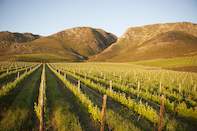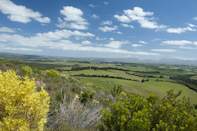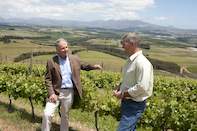Friends of pioneering farmer Sir Antonie Viljoen apparently ‘severely rebuked him for his incalculable folly’ in buying Oak Valley ‘suurveld’. But today’s visitors salute his great-grandson for unlocking its many riches.
The Redoubtable Rawbone-Viljoens

‘A worthless bit of hungry sourveld in the unfashionable and despised Groenland’ is how skeptical friends of Sir Antonie Viljoen described the nearly 1 800 hectares he bought in 1898 near the Overberg town of Grabouw in the Elgin district.
How surprised they would be to see the flourishing orchards, lush grazing, thriving oak forest and verdant vineyards on Oak Valley Estate today.
Sir Antonie was a local lad, schooled in the nearby village of Caledon, who went on to graduate as a medical doctor from the University of Edinburgh, Scotland, serve as senator in the Cape Parliament and be knighted in 1916 for peacemaking efforts in the aftermath of the South African War.
But it is his farming legacy that lives on at Oak Valley. It is now owned by the family trust, with visionary great-grandson Anthony Rawbone-Viljoen having established, not only premium vineyards and a wine portfolio, but also a free-range cattle herd, a drove of acorn-fed pigs and a cut-flower commercial enterprise.
Latterly son Christopher has come on board, first in a marketing capacity and now as CEO, managing a thriving business that has seen vineyard expansion (seeking wine ‘estate’ status with wines sourced solely from the property’s own vines), construction of a brand new winery (inaugurated with the 2018 harvest to the delight of newcomer winemaker/viticulturist Jacques du Plessis), and a restaurant, a self-catering cottage and renowned mountain-biking trails drawing visitors from all corners of the globe.
Nature Conservancy

Sir Antonie’s pioneering apple and pear orchards in 1900 were the foundation for Elgin’s deciduous fruit export success today, and the few hundred hectares of fruit trees are still a mainstay. He also established its oak woodlands and, protected in perpetuity in his will, they now cover some 30 hectares. Although you’ll drive through the woods on your way to the tasting room, they are also worth exploring on foot.
With nearly 300 hectares of mountain fynbos under its protection and an ongoing alien plant eradication programme, Oak Valley is a founder member of the local Groenlandberg Conservancy.
It is also part of the Green Mountain Eco Route, a world first in biodiversity wine routes that promote an area’s wines and its natural environment as a tourist attraction.
Mountain bikers can obtain permission to tackle the challenging 23-kilometre fynbos route designed by Oak Valley’s first young winemaker and viticulturist, the late Pieter Visser, an avid MTB rider.
The standard and beauty of the course and its location contributed to the farm becoming a two-night stopover spot on the internationally renowned Cape Epic mountain bike race.
Having established orchards and oak woods, Sir Antonie then planted substantial vineyards and built Elgin’s first wine cellar in 1908. The vines soon made way for fruit, but were reintroduced on Oak Valley in the 1980s in a joint experiment with the viticultural research institute Nietvoorbij to test this cool-climate area’s potential for premium wine production.
Pinot and Chardonnay Specialists

The results were spectacular, winning acclaim for Hemel-en-Aarde’s Bouchard Finlayson ‘Oak Valley’ wines. By 2003, with more than 30 hectares of carefully surveyed land planted to classics such as Sauvignon Blanc, Chardonnay, Pinot Noir and Merlot, Oak Valley was ready to launch its own label.
Sauvignon Blanc was a specialty, doing particularly well on the farm’s cool south-facing slopes up to 500 metres above sea level, with Bokkeveld shale set on clay and weathered shale.
The early vintages of a standard fruity Oak Valley and award-winning Mountain Reserve from high-lying vineyard blocks both showed a minerality typical of this terroir. They have made way for the farm’s single (and singular) Fountain of Youth Sauvignon Blanc, enriched by barrel-fermented Semillon.
The ‘Eskimo’ variety Pinot Noir also thrived, and a fledging mountainside block of densely planted vines in true Burgundian tradition (10 000 vines per hectare instead of the usual 3 000) soon took the quality of Oak Valley’s sought-after Pinot to a whole new level.
Different clones of the variety were planted and these are now separately bottled under the South Ridge and Fynbos Gorge labels, identifying their specific site on the farm; a rare treat for Pinotphiles.
Having originally bottled a Bordeaux-style red blend, Oak Valley has found its strength in the other great Burgundian grape, Chardonnay. Clonal variations are also vinified separately and bottled under the South Ridge label and, together with the single-vineyard Pinot Noirs, are curated in a range named Tabula Rasa (Latin for ‘clean slate’).range.
The Groenlandberg and Discovery ranges are reserved for yet more iterations of these two varieties, the latter also containing another cool-climate German varietal classic, the Stone & Steel Riesling.
Flowers and More

In addition to the Oak Valley fruit business and Oak Valley Wines, the farm has nearly 20 hectares under cut-flower production, including five hectares in hi-tech climate-controlled Dutch greenhouses.
Another 600 hectares are given over to pasture supporting a large herd of Simmentaler breeding cows which, through groundbreaking cross-breeding produce sought-after wagyu beef. An ultra-modern piggery houses acorn-fed pigs for free-range pork. Oak Valley was one of the wine industry’s early Biodiversity and Wine Champions due to its commitment to sustainable, eco-friendly and socially-conscious farming methods.
Its ethically farmed meats can be sampled at The Melting Pot Restaurant, which offers a menu comprising about 10 dishes on small plates for sharing, the selection changing every few weeks; or enjoyed in a Garden Picnic, offered during the summer months; all accompanied by Oak Valley’s fine wines.
 Across the Hottentots Holland Mountains range over Sir Lowry’s Pass lies the Winelands of Overberg a high, rocky plateau where timber plan...
Across the Hottentots Holland Mountains range over Sir Lowry’s Pass lies the Winelands of Overberg a high, rocky plateau where timber plan...